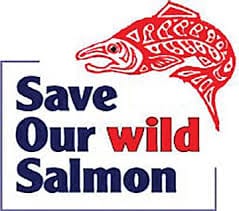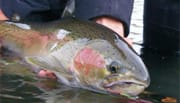Fish & Wildlife
Coalition study finds negligible cost for effective salmon recovery action
Nearly 35 years after the Northwest Power Act mandated equal treatment for fish and power generation in the Columbia-Snake system, 13 of the basin’s wild salmon and steelhead stocks are still listed under the Endangered Species Act. Recovery will require, among other measures, changes in hydropower system operations that will reduce electricity generation, such as dam removal or greatly increased spill over the dams. What would replacing the power cost Northwest energy consumers and how does it compare to escalating costs of maintaining aging power system infrastructure?
Coalition presents its two highest awards
In May, former NWEC executive director Sara Patton presented the Headwaters Award to Seattle’s Mary Smith. The award recognizes a member of NWEC’s extended family for outstanding achievements. The following day, current Coalition executive director Nancy Hirsh presented NWEC’s highest award, the Conservation Eagle, to the Coalition of Columbia Basin Tribes. The group, comprising 15 Northwest tribes, effectively advocated adding ecosystem function as a designated purpose of the Columbia River Treaty.
Group comments on the Northwest Power and Conservation Council's Draft Fish and Wildlife Program
On July 24, 14 groups submitted comments to the NPCC regarding its draft fish and wildlife program. Click here to read the group comments.
Crosscut article: Are the feds simply shielding Columbia River dams from wrecking balls?
Conservation groups, tribes, fishing groups and the state of Oregon are taking the federal government to court again because its Biological Opinion (BiOp), regarding Columbia River hydro operations, inadequately address the needs of the river’s 13 endangered salmon species. Despite previous rulings in the plaintiff’s favor, the federal government has delayed making court-ordered improvements to the BiOp.
Federal agencies squander chance for progress on Northwest salmon survival, send region back to court
Yesterday, 13 conservation and fishing groups filed a legal challenge of the latest federal plan for endangered Columbia and Snake River salmon. The organizations assert that the Obama administration’s National Marine Fisheries Service (NMFS) failed to address the core issues that triggered federal-court rejection of three previous plans, forcing another round of litigation just as momentum is building in the Northwest for a broadly supported stakeholder collaboration as an alternative to the courtroom.
Save Our Wild Salmon press release: Science panel’s review provides pathway to expanded spill test
On Friday, the Independent Scientific Advisory Board of the Northwest Power and Conservation Council released its review of Oregon’s proposal to test state, federal and Tribal scientists’ findings that increased spring spill over Columbia Basin hydropower dams would help restore endangered Columbia-Snake river salmon stocks.
Editorial: Latest salmon deal is disappointing (again)
The Daily Astorian editorial describes how the most recent biological opinion (bi-op) produced by NOAA Fisheries on behalf of the Bonneville Power Administration lacks broad stakeholder input and fails to protect endangered salmon. The editorial also purports that the bi-op disregards strategies for returning Columbia River to a more natural state.
Federal agencies squander chance for progress on Northwest salmon
The NOAA Fisheries plan for endangered Columbia and Snake River salmon fails to address the issues that triggered federal-court rejections of three previous plans. The plan, called a biological opinion, fails to help salmon, does not incorporate broad stakeholder input, and ignores climate change impacts.
Guest opinion: Columbia River plan fails to protect salmon
Sam Mace’s guest opinion article in the Spokesman-Review highlights the shortcomings of the most recent draft Biological Opinion proposed by federal agencies regarding endangered Columbia River salmon. Mace remarks that the final plan should include an analysis of lower Snake River dam removal, provisions for an enhanced spill test, and climate change considerations.
“The best fall chinook salmon run in years has made this a banner season for Columbia Basin anglers. River towns, outfitters, shops and motels throughout our region have shared in this unexpected bounty. Unfortunately, the news about many of our region’s other salmon and steelhead populations is far less encouraging. And the future for all the basin’s endangered wild salmon remains very much in doubt.”
Coalition analyzes spill test effects on electricity consumers’ bills
The NW Energy Coalition has released a pair of fact sheets addressing regional salmon scientists’ proposed experiment to measure survival gains from spilling more water over federal hydropower dams to aid the ocean-bound migration of Columbia Basin endangered wild salmon than is now required by the federal court. Court-ordered spill has increased returns of adult fish, and many regional scientists have concluded that additional spill could raise those returns even further – potentially to recovery levels for some of the endangered stocks…



![_Q8A9145ATNIAWARD[1] _Q8A9145ATNIAWARD[1]](https://nwenergy.org/wp-content/uploads/2015/06/Q8A9145ATNIAWARD1.jpg)





